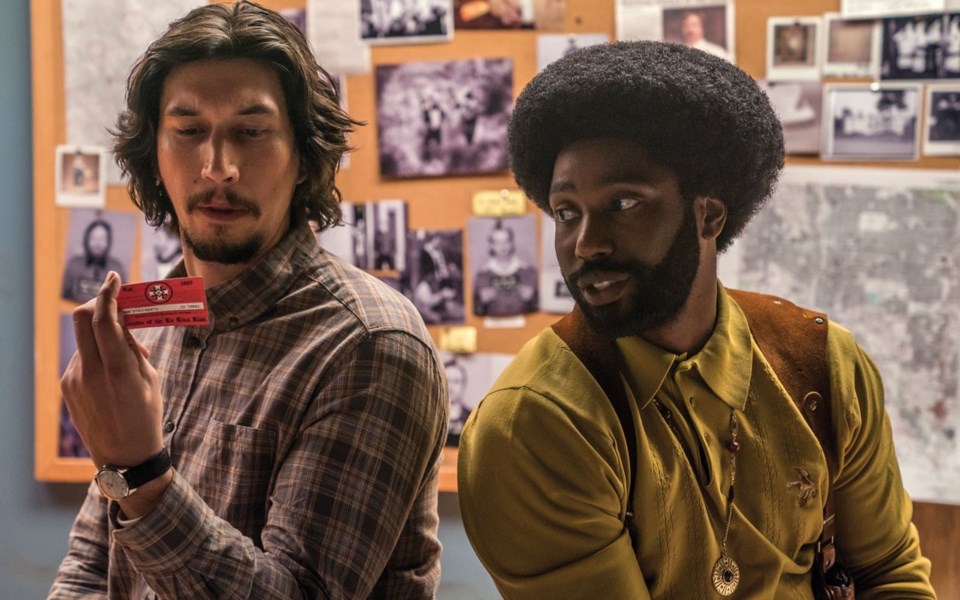Here's an inspiring film fact: Charlie Wachtel and David Rabinowitz, the screenwriters of BlacKkKlansman, still had day jobs when they sold their script.
The film—based on the memoir of Ron Stallworth, Colorado Springs' first black police officer who went undercover with the KKK—has gone on to be one of the biggest films of the year. Steeped in drama and brushed with humour, it hits deep at the heart of America's current race relations, despite being set in the early '70s.
"It was insane, looking back at how everything happened," says Rabinowitz. "We had no idea this would happen. That was our first script we sold. We were not professionals; this led us to being full-time professionals."
The pair, who first began making videos in high school, had written one TV pilot together when Wachtel first came across Stallworth's remarkable memoir—which was only available on Kindle at the time. "We both read it and we were like, 'This should be a movie. Why isn't this a movie?'" Rabinowitz says. "We reached out to the publisher and the publisher put us in touch with Ron."
Stallworth was interested right away, even with the caveat that adapting books to scripts often means tweaking them to be more cinematic. "It was a collaboration right from the beginning," Wachtel says. "That was great because we were able to lean on Ron as a resource with his police expertise. We didn't have experience doing any of that kind of stuff. It brought a degree of authenticity to the story."
After finishing the script in 2015, Wachtel reached out to a contact in Hollywood named Shaun Redick, who was in pre-production with a film called Get Out.
Redick got excited and passed it on to that film's director, Jordan Peele, who decided to produce the film. Most people know what happens next—Get Out became a huge hit, earning an Academy Award for Best Original Screenplay and nominations for Best Picture and Best Director.
"In early 2017, when Get Out came out, Jordan is on top of the world, he's our producer, but not only that, the company we're working with produced Get Out, so they can do whatever they want," Rabinowitz recalls.
To that end, they recruited Spike Lee to direct BlackKklansman. "We thought the story was great, but ultimately it was Ron's story," Wachtel says. "It was helpful that ultimately everything we were doing was in service of Ron's story. When Spike came on and (we were told) Spike and his partners wanted to do a pass on it, we were like, 'Great, that's what you want.' You want him to insert his voice and make it a Spike Lee movie."
While they had Lee and Stallworth's contributions, the duo also offered a Jewish perspective, adding Adam Driver's character, a Jewish detective named Flip Zimmerman, as Stallworth's partner in the undercover operation.
For the real-life Stallworth, that additional detail, "gave him confidence that we could do it," Rabinowitz says.
"You're creating a more personal connection with the material by mining it from an area that you feel strongly about," Wachtel says. "And also, the whole idea of David Duke (Grand Wizard of the KKK) being the central villain, Duke is obviously racist in a lot of ways, but one of his biggest things is anti-Semitism. In multiple ways, it fit with the story and us."
The other uncanny bit of timing involved in the film: when they started writing the script Barack Obama was still president. Fast-forward a year during rewrites and President Donald Trump is leading the country—along with all the implications that has brought.
"You're always trying to make what you write current and keep it relevant to political events," Wachtel says. "That was absolutely on our minds because obviously if you were to release the film in 2015 versus what we were seeing in 2016, you'll get a completely different response."
The first time they watched the audience response was at the Cannes Film Festival earlier this year. It was a surreal experience, they say.
"We had read the shooting script so we had a general idea of how things were changed," Wachtel says. "Nothing prepares you for seeing the movie for the first time, especially at Cannes."
Meanwhile, Wachtel and Rabinowitz have been named part of Variety's 10 Screenwriters to Watch, and will be honoured at an event at the Whistler Film Festival on Saturday, Dec. 1 hosted by George Stroumboulopoulos.
"I think it's great," Rabinowitz says. "Obviously when you hear about it, you do research and go back to the previous years and look back at writers that were on it and you see these really, really accomplished names. And that's really cool."
For more information or for tickets, visit whistlerfilmfestival.com.




